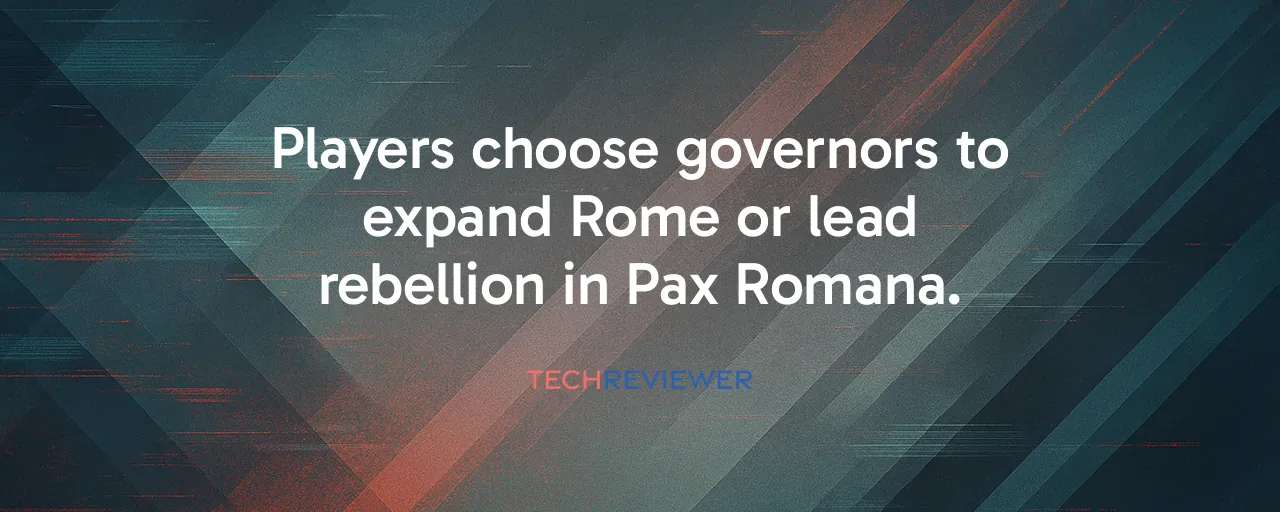A New Era for Anno's Empire
When Ubisoft announced Anno 117: Pax Romana, strategy fans perked up. The series, a staple of city-building since 1998, has always thrived on crafting intricate economies across sprawling islands. But this time Ubisoft Mainz is shaking things up with a bold twist: a story-driven campaign where players choose between two Roman governors, Marcus and Marcia, each with distinct narratives. Set during the Pax Romana, the game invites you to either expand Rome's reach in Latium or stir rebellion in Celtic Albion. This isn't just another sandbox; it's a chance to shape history through your decisions.
What makes this shift exciting is how it responds to a growing hunger for narrative in strategy games. Players no longer want just numbers and production chains. They crave stories that give their cities meaning. Anno 117 delivers this by weaving character-driven choices into its familiar mechanics, creating a hybrid that feels both fresh and true to the series' roots. Let's dive into how this dual-protagonist system and revamped gameplay are setting a new standard.
Two Governors, Endless Choices
For the first time in Anno's 27-year run, you pick your protagonist. Marcus, a traditional Roman governor, grapples with self-doubt as he seeks to prove his worth. Marcia, a rare female leader in a male-dominated empire, challenges societal norms with a mysterious rise to power. Their stories aren't just window dressing; they shape how you govern. In Latium you might focus on diplomacy to strengthen Rome's grip, while in Albion you could fuel economic rebellion among Celtic tribes. Each path offers unique missions and perspectives that make every campaign feel personal.
Preview coverage from October 2025 highlights Marcia's storyline as a standout, tackling gender dynamics in Roman society with nuance. Yet, some early feedback notes that Act 1 choices often lead to similar outcomes, raising questions about how much your decisions truly matter. Still, the promise of replayability is clear: two governors mean two distinct ways to experience Rome's golden age, encouraging players to return and explore both sides.
Gameplay That Welcomes All
Beyond its narrative, Anno 117 reworks its core systems to balance accessibility with depth. The optional needs system is a game-changer, letting players meet resident demands, like food or public services, through flexible combinations. Want to feed your people? Sardines or porridge both work, each contributing points to a category threshold. Higher-tier goods like bread offer bigger bonuses, but you don't need everything to progress. This setup lets newcomers build simpler economies while veterans chase optimal strategies.
The game also introduces building buffs, where placement matters as much as production. A bakery boosts nearby income but lowers fire safety, turning city layouts into strategic puzzles. When you add attributes like health, knowledge, and prestige, you get a system where every choice ripples across your empire. Cross-platform features, including co-op and cross-progression, make it easy to team up or switch devices, while modding support at launch invites community creativity. These changes show Ubisoft Mainz listening to both new players and Anno 1800's devoted fanbase.
Lessons From Anno 1800 and Total War
To understand Anno 117's potential, look at Anno 1800 and Total War. Anno 1800, a high-water mark for the series, kept players hooked for years with deep mechanics and regular DLC. Its weekly developer blogs built trust, though some fans worry Anno 117's quieter updates signal less engagement. Still, 1800's success proves that robust systems and post-launch support can sustain a community. Anno 117's Year 1 Pass, with expansions like Provinces of Ash and The Hippodrome, follows this model, promising fresh content through 2026.
Meanwhile, Total War offers a blueprint for blending strategy with story. Its historical campaigns mix grand strategy with character-driven plots, much like Anno 117's dual governors. But where Total War leans on battles, Anno focuses on economic finesse. Both show that narrative can elevate strategy without losing complexity. The lesson? Players want choices that feel meaningful, whether commanding armies or building cities. Anno 117's challenge is ensuring its branching paths deliver real consequences, unlike early previews suggesting Act 1's limited divergence.
What Lies Ahead for Strategy Games
Anno 117 arrives at a pivotal moment. Strategy games in 2025 are embracing stories to stand out in a crowded market. Ubisoft Mainz's gamble, pairing narrative depth with economic simulation, could redefine the genre. If successful, it might inspire other studios to weave richer tales into their systems. The game's modding tools and co-op features also tap into a growing demand for community-driven and social play, extending its lifespan well beyond launch.
Yet, challenges remain. Some veteran players may find the tutorial-heavy campaign too restrictive, while casual fans might balk at the premium price, especially with the Year 1 Pass. Balancing these audiences will determine Anno 117's legacy. For now, its blend of choice, strategy, and history offers a compelling vision of what city-building can be. As players prepare to govern Rome or defy it, one thing's clear: this is a strategy game that dares to tell a story.
